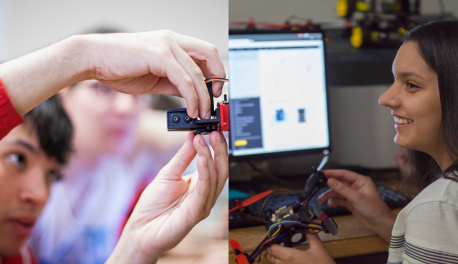

Nikolaos A. Gatsonis received his undergraduate Ptychion (BS degree) in Physics at the Aristotelian University of Thessaloniki, Greece (1983), an M.S. in Atmospheric Science at the University of Michigan (1996), an M.S. (1987) and a Ph.D. (1991) in the Aeronautics and Astronautics department of MIT. From 1991 to 1993 he was a Postdoctoral Fellow at the Space Department of the Johns Hopkins University Applied Physics Laboratory. In 1994 he joined the Mechanical Engineering faculty at WPI, promoted to Associate Professor in 2000 and to Professor in 2005. He is the Founding Director of the B.S. (2005), M.S. (2014) and Ph.D. (2014) programs in Aerospace Engineering at WPI and was Associate Department Head of Mechanical Engineering from 2007 to 2010. He was named the inaugural Head of the Aerospace Engineering Department in 2020.
Professor Gatsonis’ research involves developing continuum, atomistic, and hybrid models, along with computational methods for fluids, gases, and plasmas in regimes ranging from nanoscale to macroscale and from low-speed to hypersonic. He applies these methods to fields such as spacecraft micropropulsion, plasma devices and diagnostics, spacecraft-environment interactions, rarefied gas dynamics, complex flows under microgravity, materials processing, nanospacecraft attitude dynamics and control, real-time control and estimation for UAVs, and biofluids modeling under microgravity. He has participated in spacecraft propulsion development programs including the NASA GRC EO-1 Pulsed Plasma Thruster, the JHU APL micro-liquid-fed PPT, the BUSEK Inc. Advanced micro Pulsed Plasma Thruster flown on FalconSat-3, the BUSEK Compact Induced Current Hall Thruster, and the BUSEK High Current Hollow Cathode Tungsten Emitter. He contributed to the mission design of the Nuclear Electric Propulsion Space Test Program (NEPSTP) satellite and participated in space flight projects such as the Active Geophysical Rocket Experiment (AGRE), the Active Plasma Experiment (APEX), the Vehicle Interactions Program (VIP), and the Environmental Monitor Package (EMP). His research funding sources include AFOSR Computational Mathematics program, AFOSR Dynamics and Controls program, the Army Research Laboratory, DARPA, NSF’s Nanotechnology and Interdisciplinary Research Initiative, DOE, NSF’s Nanoscale Exploratory Research, NASA Jet Propulsion Laboratory, NASA Glenn Research Center, Johns Hopkins University Applied Physics Laboratory, NASA microgravity materials program, NASA PSI Program, ONR NEEC Program, and NASA’s Massachusetts Space Grant Consortium. He has built a strong record of industrial collaborations and support through numerous STTR and SBIR programs. He has advised over 30 graduate students on Ph.D. dissertations and Master’s theses, supervised more than 10 Postdoctoral Fellows, and has authored over 125 publications.
Professor Gatsonis has developed and taught numerous undergraduate and graduate courses at WPI in fluid dynamics, aerodynamics, plasmas, propulsion, and computational methods. He advised over sixty senior design theses (Major Qualifying Projects) involving more than 200 undergraduates. He also taught several graduate courses in industrial settings. Additionally, he has been involved in developing and delivering various K-12 STEM outreach programs funded by NASA’s Space Grant Consortium.
Professor Gatsonis received in 1995 and 2006 the Morgan Distinguished Instructorship in Mechanical Engineering, and in 1999 the Norton/Saint Cobain Award in Recognition of Leadership in Integrated Graduate and Undergraduate Research in Mechanical Engineering. A recipient of the WPI Trustees Award for Outstanding Research and Creative Scholarship in 2004, he was named the WPI George I. Alden Professor in Engineering from 2007-2010 and the John Woodman Higgins Professor in 2013.
Professor Gatsonis has an extended record of professional activities and service. He has been an Associate Editor of the Aerospace Science and Technology Journal. He has been an affiliate representative of the Massachusetts Space Grant Consortium since 1995. He was a member of the Steering Committee for the Decadal Survey on Biological and Physical Sciences in Space of the National Academies (2009-2010). He was an Associate Editor of the AIAA Journal of Spacecraft and Rockets (2003-2006). He was a member of the AIAA Electric Propulsion Technical Committee (1998-2003) and the AIAA Space Science Technical Committee (1992-1996). He served in proposal reviews and technical panels for the AFOSR, NSF, NASA, and DOE, and as a reviewer of tenure and promotion portfolios at various universities. He has organized numerous sessions for AIAA and IEEE conferences. His service to WPI includes numerous departmental and campus-wide academic planning committees, tenure and awards committees, as well as hiring committees for faculty, senior administrators, and staff.

Nikolaos A. Gatsonis received his undergraduate Ptychion (BS degree) in Physics at the Aristotelian University of Thessaloniki, Greece (1983), an M.S. in Atmospheric Science at the University of Michigan (1996), an M.S. (1987) and a Ph.D. (1991) in the Aeronautics and Astronautics department of MIT. From 1991 to 1993 he was a Postdoctoral Fellow at the Space Department of the Johns Hopkins University Applied Physics Laboratory. In 1994 he joined the Mechanical Engineering faculty at WPI, promoted to Associate Professor in 2000 and to Professor in 2005. He is the Founding Director of the B.S. (2005), M.S. (2014) and Ph.D. (2014) programs in Aerospace Engineering at WPI and was Associate Department Head of Mechanical Engineering from 2007 to 2010. He was named the inaugural Head of the Aerospace Engineering Department in 2020.
Professor Gatsonis’ research involves developing continuum, atomistic, and hybrid models, along with computational methods for fluids, gases, and plasmas in regimes ranging from nanoscale to macroscale and from low-speed to hypersonic. He applies these methods to fields such as spacecraft micropropulsion, plasma devices and diagnostics, spacecraft-environment interactions, rarefied gas dynamics, complex flows under microgravity, materials processing, nanospacecraft attitude dynamics and control, real-time control and estimation for UAVs, and biofluids modeling under microgravity. He has participated in spacecraft propulsion development programs including the NASA GRC EO-1 Pulsed Plasma Thruster, the JHU APL micro-liquid-fed PPT, the BUSEK Inc. Advanced micro Pulsed Plasma Thruster flown on FalconSat-3, the BUSEK Compact Induced Current Hall Thruster, and the BUSEK High Current Hollow Cathode Tungsten Emitter. He contributed to the mission design of the Nuclear Electric Propulsion Space Test Program (NEPSTP) satellite and participated in space flight projects such as the Active Geophysical Rocket Experiment (AGRE), the Active Plasma Experiment (APEX), the Vehicle Interactions Program (VIP), and the Environmental Monitor Package (EMP). His research funding sources include AFOSR Computational Mathematics program, AFOSR Dynamics and Controls program, the Army Research Laboratory, DARPA, NSF’s Nanotechnology and Interdisciplinary Research Initiative, DOE, NSF’s Nanoscale Exploratory Research, NASA Jet Propulsion Laboratory, NASA Glenn Research Center, Johns Hopkins University Applied Physics Laboratory, NASA microgravity materials program, NASA PSI Program, ONR NEEC Program, and NASA’s Massachusetts Space Grant Consortium. He has built a strong record of industrial collaborations and support through numerous STTR and SBIR programs. He has advised over 30 graduate students on Ph.D. dissertations and Master’s theses, supervised more than 10 Postdoctoral Fellows, and has authored over 125 publications.
Professor Gatsonis has developed and taught numerous undergraduate and graduate courses at WPI in fluid dynamics, aerodynamics, plasmas, propulsion, and computational methods. He advised over sixty senior design theses (Major Qualifying Projects) involving more than 200 undergraduates. He also taught several graduate courses in industrial settings. Additionally, he has been involved in developing and delivering various K-12 STEM outreach programs funded by NASA’s Space Grant Consortium.
Professor Gatsonis received in 1995 and 2006 the Morgan Distinguished Instructorship in Mechanical Engineering, and in 1999 the Norton/Saint Cobain Award in Recognition of Leadership in Integrated Graduate and Undergraduate Research in Mechanical Engineering. A recipient of the WPI Trustees Award for Outstanding Research and Creative Scholarship in 2004, he was named the WPI George I. Alden Professor in Engineering from 2007-2010 and the John Woodman Higgins Professor in 2013.
Professor Gatsonis has an extended record of professional activities and service. He has been an Associate Editor of the Aerospace Science and Technology Journal. He has been an affiliate representative of the Massachusetts Space Grant Consortium since 1995. He was a member of the Steering Committee for the Decadal Survey on Biological and Physical Sciences in Space of the National Academies (2009-2010). He was an Associate Editor of the AIAA Journal of Spacecraft and Rockets (2003-2006). He was a member of the AIAA Electric Propulsion Technical Committee (1998-2003) and the AIAA Space Science Technical Committee (1992-1996). He served in proposal reviews and technical panels for the AFOSR, NSF, NASA, and DOE, and as a reviewer of tenure and promotion portfolios at various universities. He has organized numerous sessions for AIAA and IEEE conferences. His service to WPI includes numerous departmental and campus-wide academic planning committees, tenure and awards committees, as well as hiring committees for faculty, senior administrators, and staff.
Scholarly Work
N. A. Gatsonis, X. Tian, M. Demetriou, J. Burns, ”A heterogeneous non-overlapping domain decomposition explicit finite volume method for a real-time hybrid process-state estimator of 3D unsteady advection-diffusion fields,” Journal of Computational Physics, Vol. 464, Issue C, 111257, Sept. 2022, https://doi.org/10.1016/j.jcp.2022.111257
W. Hu, M. A. Demetriou, X. Tian, N. A. Gatsonis, “Hybrid domain decomposition filters for advection-diffusion PDEs with mobile sensors,” Automatica, Vol. 138, April 2022, 110109. https://doi.org/10.1016/j.automatica.2021.110109
A.K. Moorthy, J. J Blandino, M.A. Demetriou, and N. A. Gatsonis "Extended orbital flight of a CubeSat in the lower thermosphere with active attitude control," AIAA Journal of Spacecraft and Rockets, Vol. 58, Issue 6, pp 1876-1892, Dec. 2021, doi: 10.2514/1.A34975
J. Yang and N. A. Gatsonis, “A Smooth Dissipative Particle Dynamics method for nonisothermal liquid and gas flows in bounded domains,” Journal of Computational Physics, Vol. 394, pp. 679-699, Oct. 2019, doi: 10.1016/j.jcp.2019.04.040.
S. Averkin and N. A. Gatsonis, “A parallel electrostatic Particle-in-Cell method on unstructured tetrahedral grids for large-scale bounded collisionless plasma simulations,” Journal of Computational Physics, Vol. 363, pp. 178-199, June 2018, doi: 10.1016/j.jcp.2018.02.011.
S. Averkin, N. A. Gatsonis, and L. Olson, “Investigation of the radio frequency discharge in a high current negative hydrogen ion source with a global enhanced vibrational kinetic model,” IEEE Transactions on Plasma Science, Vol. 45, No. 9, pp. 2460 – 2471, Sept. 2017, doi: 10.1109/TPS.2017.2738920.
